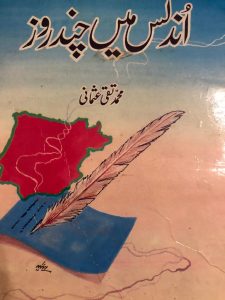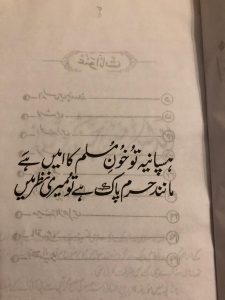I begin in the Name of The Almighty, The Most Beneficent, The Most Merciful

As we at the Muslim Welfare Institute (MWI) started to work in Albania in 1993, my respected teacher Ḥaḍrat Mufti Shabbir Ṣāḥib gave me a copy of ‘Undlus mey chund roz’ written by Ḥaḍrat Mufti Taqī Us̱mānī, مدظله العالی.

The booklet was an account of Mufti Taqi Ṣāḥib’s visit to Spain; a compilation of facts and figures enriched with history and tradition. The power of the pen was clearly evident. It was a fascinating book to say the least, and I immediately became a fan of the author.

Having been blessed with an opportunity to visit Spain in 1989, I could relate to the locations, which enhanced the enjoyment.
Mufti Taqī Us̱mānī Ṣāḥib visited Blackburn some time later and even though I met him very briefly, his personality left a great effect on me. When I received a copy of ‘Jahān-e-Dīdah’, a compilation of Mufti Taqī Us̱mānī’s travels to 20 countries, my happiness and joy knew no bounds. By this time we had started to work in Bangladesh & India as well, and ‘Jahān-e-Dīdah’ became my travel companion. I dared not go on any journey without this fantastic travelogue.
Mufti Taqi Ṣāḥib visited Blackburn again and we had the chance to touch upon our work in Albania. When asked if he could guide us on how we should work in Albania, his answer was short and simple: ‘The same Almighty Allāh who has taken you to Albania will surely guide you. What can I say as I haven’t been there’. Mufti Ṣāḥib’s humbleness was remarkable.
Having read it from cover to cover, especially during my travels, I used to mention ‘Jahān-e-Dīdah’ and Mufti Taqi Ṣāḥib’s travels to many different people I met, in the UK and abroad, Muslims & non-Muslims. Many were fascinated and those who could not read Urdu always felt left out as they could not take part in Mufti Taqi Ṣāḥib’s travels. Indeed that was exactly how Mufti Ṣāḥib made one feel; it was as though we were there in person. His method of describing the places he was visiting, blended with the history, was truly dynamic and unique. The research and reference of the facts and figures were second to none and the Urdu style was captivating. Mufti Ṣāḥib was truly gifted and ‘Jahān-e-Dīdah’ was part of that talent.
Then along came ‘Dunyā meyre āgey’, the next instalment of Mufti Taqi Ṣāḥib’s travels; another fascinating compilation of a number of countries visited since the publication of ‘Jahān-e-Dīdah’. Again, a truly amazing book, which became my second travel companion. Mufti Ṣāḥib’s accounts of his visits to many parts of the world were inspiring and heart capturing.
In 2006, MWI invited Mufti Taqī Us̱mānī to visit Albania. He accepted our offer and the 4 days spent with Mufti Taqi Ṣāḥib in Albania rank high amongst the most memorable days of my life. After returning from Albania, we requested Mufti Taqi Ṣāḥib to write a few words about the journey, which would become the icing on the cake. Mufti Ṣāḥib penned ‘Albania me chund roz’, on this historic & memorable visit; again an amazing composition.
Having read Mufti Taqi Ṣāḥib’s travels to over 50 countries (many visited more than once) in 2 hardback volumes and 2 booklets, I couldn’t believe how so much information about so many countries had been collected. These books were like precious gems because they contained such unique information; it was unbelievable.
‘Jahān-e-Dīdah’ was my guide when I was blessed with the opportunity of visiting Istanbul (Turkey) in 2000, especially the Blessed Grave of Ḥaḍrat Abū Ayyūb al-Anṣārī, رَضِيَ ٱللَّٰهُ عَنْهُ, and the Topkapi Palace. The same travelogue assisted me enormously when I arrived in Uttar Pradesh (India) in 2003. From Jalālābād to Thāna Bhavan, Gangoh to Nānota, and Mazāhir Uloom to Deoband, ‘Jahān-e-Dīdah’ provided detailed information on each & every corner, truly fascinating in its content.
In a nutshell, I realised the value of books on travel to different countries. Mufti Taqi Ṣāḥib had opened up a number of countries to me. It was as though I had been there personally and was therefore, like a vast treasure I had come across.
As all of Mufti Ṣāḥib’s travels are compiled in Urdu, a thought kept crossing my mind: how wonderful it would be if these travels were translated into English? This was no ordinary task; in my view, it was extremely difficult, if not impossible, to faithfully bring Mufti Ṣāḥib’s recollections into another language. Justice would not have been done to such classical work.
However, another thought also kept crossing my mind. I had been blessed with visiting some 20 countries over a period of 25 years (some of them many times). The first was Saudi Arabia (July 1986) where I was blessed with visiting 2 of the 3 holiest places on earth, Masjid al-Ḥarām in Makkah al-Mukarramah and al-Masjid an-Nabawī, صَلَّىٰ ٱللَّٰهُ عَلَيْهِ وَسَلَّمَ, in Madīnah, during Ramaḍān. Some 25 years and 20 countries later, I have been blessed with the opportunity of fulfilling my lifetime dream, to visit the 3rd holiest place on earth, al-Masjid al-‘Aqṣā in al-Quds (Jerusalem).
Therefore, after a lot of thought & consideration, on this Wednesday 8th February 2012, I have put the proverbial pen to paper. My intention is not to write my travels in detail, as much as I would like to, as my knowledge and research of the countries and places I visited is very shallow. This is just a brief account of the countries visited, including the purpose, companions, names of places, and personalities met during the visit.
جَزَاكَ اللَّهُ خَيْرًا
Request for Du’ās
وَالسَّلَامُ Hanif Dudhwala